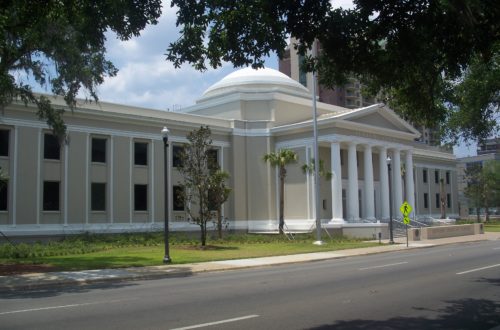With the progression of Florida’s legislative session has come a slurry of controversial bills. One of the most heavily debated is HB 5, which passed 78-39 in the Florida House minutes after midnight, closing out a House session that began the previous day on Feb. 16.
What is the controversy around Florida House Bill 5?
The Florida bill follows in the footsteps of Texas’ notorious SB 8 and structurally resembles Mississippi’s 15-week ban, both of which are being challenged in courts.
It opens with benign, positive language regarding tobacco regulations and natal health. Controversy surrounds the bill’s second half, which proposes to cut off legal access to an abortion at 15 weeks following conception. Florida law currently legalizes abortion until the start of the third trimester at week 28 of 40 in pregnancy.
The bill carves out exceptions for if the fetus is not viable, or if two physicians deem an abortion necessary to save the woman’s life. If a second physician is not available, a single physician may perform the abortion to save the woman’s life.
An amendment to allow exceptions for cases of rape died on the floor of the House.
The bill would roll back protections established under Roe v. Wade and Planned Parenthood v. Casey. It has a similar companion in the Florida Senate undergoing committee review — SB 146.
Abortions have increasingly become a more politically divisive topic despite the fact that struggles for reproductive rights date back to the 1900s. The 1973 case Roe v. Wade gave women the fundamental, constitutionally protected right to the privacy of making decisions about abortion in the first trimester.
In 1992, Planned Parenthood v. Casey further ruled that states could not place an undue burden on women seeking abortions before viability outside the womb. The current threshold of viability is roughly 24 weeks, per Casey.
Already, HB 5 has advanced through its 3 committees, seemingly fast-tracked in the GOP-controlled Florida House as a committee substitute with minor changes to the original, which were largely structural. Its final destination in the House was the full chamber where it was heard on Feb. 17 and received fiery comments from both sides of the aisle.
Opinions differed between representatives early in the deliberative process. Rep. Anna Eskamani, D-Orlando, spoke on the bill in its first committee, the Professions & Public Health Subcommittee, alleging it was the “beginning of a rapist bill of rights.” The sponsor of the bill, Rep. Erin Grall, R-Vero Beach, claimed it “will be saving nearly 5,000 babies a year.”
After that committee debate, the bill passed 12-6 along partisan lines, with 2 members absent.
The bill then passed its second committee, the Healthcare Appropriations Subcommittee, 10-5, again along party lines, then 14-7 in the third, the Health & Human Services Committee. All amendments to curtail the bill have failed.
Of note, when Rep. Carlos Guillermo Smith, D-Orlando, asked Grall about the constitutionality of the bill in the second committee, she admitted “it conflicts with the [Supreme] Court’s current interpretation of the 14th Amendment.”
After 2 days leading into a third of discussion, HB 5 finally passed the full House in the early morning of Feb. 17.
The long-term fate of this law depends on the Florida Senate and governor.
What does each side of the debate say?
As is the case with most controversial legislation, there was a massive public outcry. During the public comment for the first committee, many members of the public spoke out.
The anti-abortion camp saw support from a wide array of people. Representatives of Florida Voice for the Unborn, the Florida Conference of Catholic Bishops, the Republican Liberty Caucus of Florida and the Florida Family Policy Council all made appearances.
These supporters brought many perspectives. Several advocated for the bill on the principles of their religion, while some felt the bill was not severe enough. One physician showed support based on the principles of the sanctity of life. The chair of the Republican Liberty Caucus claimed it was amoral to not “see life” with modern imaging technology.
Among the pro-choice camp were representatives for Equality Florida, the Florida Coalition for Transgender Liberation, Women’s Voices of Southwest Florida, the League of Women Voters of Florida, American Atheists, the ACLU of Florida and others.
Those who spoke noted how the bill restricted women’s rights to their bodily autonomy and was plainly unconstitutional. Some noted how women may not be aware they are pregnant at 15 weeks. A social worker noted that the bill went against science and basic ethics. The American Atheists made the point that any specific religion should not be allowed to impose itself in government, which some argue this bill seeks to achieve.
Similar public comments were ‘heard’ at the other committees. Unfortunately, the numerous voices of the pro-choice advocates fell on deaf ears.
Protestors came out to continue the fight as the bill was considered by the full House. Florida Planned Parenthood Action protested for hours outside the Florida Legislature early in the day, and some sat in the gallery during discussion.
As Grall gave closing remarks, chants of “my body, my choice” broke out in the gallery, delaying the vote and forcing a brief recess. In spite of this, the bill passed and their efforts were squashed.
What is the takeaway?
HB 5 marks a sad new chapter in Florida history. Despite the melancholy, this is in line with efforts by the GOP across the U.S. to find creative ways to curtail Roe and Casey. Due to the fairly concrete nature of Supreme Court precedent, there has been a mixed approach to attacking abortion rights.
The first approach is holding out for a U.S. Supreme Court with enough anti-abortion justices to simply accept a new precedent and strike down precedent.
As this takes time, there is another approach: incrementalism. With every new variant of an anti-abortion bill, state legislators nationwide test the waters to see if their flavor of it will finally be accepted. Texas is testing the constitutionality of a post-6-week ban while many others are testing a post-15-week ban. In essence, they are incrementally checking what they can and cannot do.
Ultimately, they seem to hope that one of these tests will slip through as acceptable enough. Once one bill is allowed by the U.S. Supreme Court, even if it’s by a mere refusal to hear the lower court’s case, then rights fall like dominos.
Per the Guttmacher Institute, a pro-choice research organization, several states have some sort of law limiting abortion rights already on the books as of 2022. For instance, 13 states require counseling on the purported ability of a fetus to feel pain, 12 states limit coverage to private plans, and 25 states require waiting periods between counseling and the actual procedure.
Moreover, shoving more bills out allows anti-abortion legislation to work — at least temporarily — while the challenges move through the slow gears of the judicial system.
This new Florida bill, if the culture war trend continues, will likely be signed. Along with fights against Critical Race Theory and vaccines, this is a pandering move by some in the GOP to strum up support from their base and push worse curtailments of freedom.
Having already passed one chamber, it is up to the Florida Senate to either stand for or against the women of Florida.
If passed by the Senate and signed by the governor, HB 5 would take effect in July 2022 and have immeasurable impacts on Florida’s future.
Check out other recent articles from Florida Political Review here.
Featured Image: Protestors outside the U.S. Supreme Court, during the hearing of the Whole Woman’s Health v. Hellerstedt Texas abortion case. Unmodified photo by Adam Fagen, used under a Creative Commons license. (https://bit.ly/335pFly)





